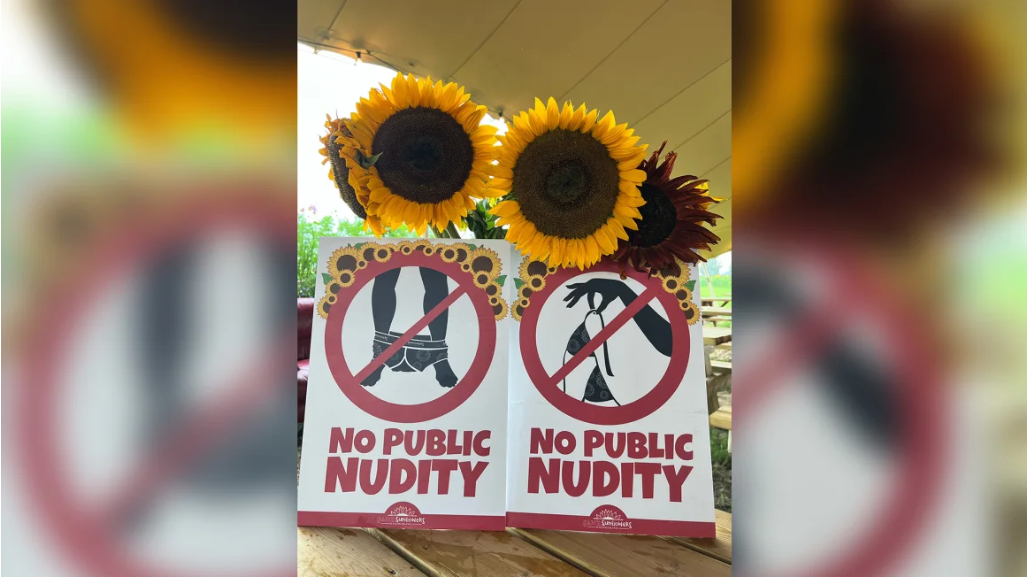In 2012, a male classmate asked then-14-year-old Leah Juliett to share naked pictures. They had a crush on the boy and sent him four images but declined to send more when the boy asked for pictures of their private parts.
Juliett later found out their pictures had been circulated at school and on a website known for distributing sexual images without a person’s consent.
‘’Having my images online and having no control really made me hyper control everything else in my life in an attempt to take that control back,’’ Juliett, now 26, told CNN, adding that it severely affected their mental health.
But Juliett took action.
The non-binary activist founded March Against Revenge Porn, an international cyber civil rights organization based in the US which led multiple marches and campaigns for legislation against this form of image-based abuse.
The organization is currently undergoing a rebrand.
“Being able to transition from victim to advocate to activist and now lived experience expert has given me opportunities to make tangible change on this issue,” said Juliett.
‘’I’ll never regret talking about my story a million times, and so publicly, because it really did save my life and helped me to facilitate change for other people.”
What is ‘revenge porn’?
“Revenge porn” is the popular term used for sexually explicit imagery that was stolen, shared, or otherwise distributed without the person’s consent.
The UK government defines the term as the sharing of images in this way with the intent to humiliate or cause distress, typically involving publishing or posting images on social media, in private group chats or online.
Along with their images, a victim’s personal information such as names, addresses and links to their social media profiles are sometimes shared.
The term “revenge porn” is considered misleading by many academics and activists who argue that many perpetrators are not motivated by retaliation and that the term implies victim-blaming.
They state that the correct term should be image-based abuse, image-based sexual abuse, or non-consensual pornography.
What is the impact of so-called revenge porn?
While anybody can be a victim of image-based sexual abuse, or so-called revenge porn, women are more likely to be targeted than men, as is the case for sexual or gendered abuse and harassment online more broadly.
And being a victim of this form of abuse can have significant consequences on a person’s health and wellbeing.
Kuhan Manokaran, a lawyer who has experience assisting victims of image-based online violence in Malaysia told CNN that the main challenge he faces is helping clients overcome their embarrassment and the stigma associated with being targeted in this way.
“In Asian cultures, sex is considered a ‘taboo subject’ and seldom discussed in public. Therefore, many men and women hesitate in coming forward, let alone lodging a report or narrating what actually transpired to their lawyers.
Some even feel silly or foolish for having trusted the perpetrator, and this adds another layer of complexity to the case,” he said.
Research has found that people can experience trust issues after being targeted by non-consensual pornography, while also suffering from anxiety, depression and post traumatic stress disorder (PTSD), and many of these mental health impacts are similar to to those caused by sexual assault.
It has also been found that in coping with the experience, people may first deal with the abuse in a negative way, such as being in denial and self-medicating, and as time passes, turn to positive coping mechanisms, such as seeking professional help, according to the 2016 study published in the journal Feminist Criminology.
Image-based sexual abuse can also occur when someone’s image is taken without their consent. In South Korea, for example, the use of spycams — the use of tiny, hidden cameras to film victims naked, urinating or having sex — in spaces like toilets or hotels has become endemic.
Victims of non-consensual capture and distribution of intimate images have said they struggle with escaping the stigma, which can lead to feeling excluded in public spaces, have a negative impact on education and employment opportunities, and in some cases, lead to suicide, according to a 2021 report from Human Rights Watch.
The threat of sharing one’s intimate images is a known coercive or control tactic, according to a 2016 survey conducted by research non-profit Data & Society and the Center for Innovative Public Health Research.
The survey found that 3% of American internet users aged 15 years or older “have had someone threaten to post nearly nude or nude photos or videos of them online to hurt or embarrass them.”













